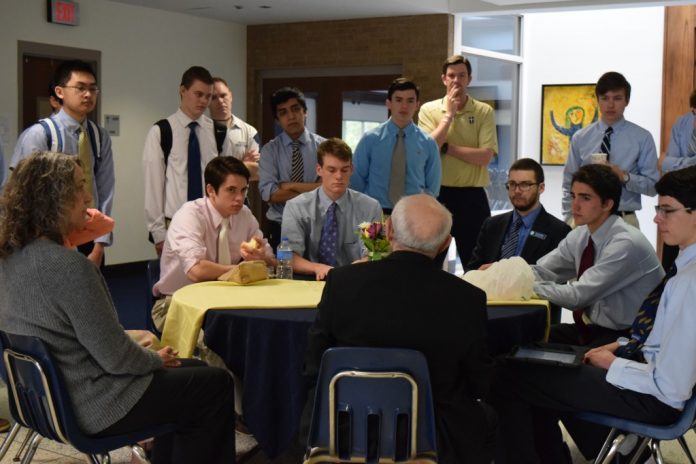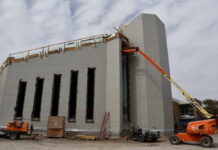“For the dead and the living we must bear witness,” writes Elie Wiesel for President Carter before the opening of The United States Holocaust Memorial Museum. This quote has great meaning, as it calls for us to “bear witness” to the awful truth that is prejudice, intolerance, and hatred in the world. It serves as a reminder to remain vigilant against evil and to listen closely to those who share their stories about injustice.
On Saturday, March 21, the Jesuit community had the opportunity to listen to many of these stories from men and women who survived the Holocaust. Jesuit College Prep helped to host a “prom” in conjunction with the Holocaust Museum in Dallas for survivors of the Holocaust and their families. It was a fantastic chance for the men and women to come together and share solidarity, food, and laughter with friends and family. Service coordinator, Mr. Rich Perry, emphasized that the event’s key purpose was “to share stories of hope, stories of experiences, stories about the results of hatred and prejudice, and, most importantly, what the results can be from peace, love, and acceptance of all people.”
With a large community of Holocaust survivors surrounding Jesuit in the Dallas metropolitan area, the Holocaust Museum in Dallas was searching for a place to hold their spring event. Jesuit’s close relationship with the Dallas Holocaust Museum Center for Education and Tolerance provided Jesuit the opportunity to open up its campus to these incredible men and women for an afternoon of fun. The members of the museum originally thought up a Spring Event, but moved on to the idea of a Spring Fling. Later, they arrived at the idea of a “Survivors’ Prom,” as many of the survivors did not have the chance to go to high school in Europe during their time as teenagers, and, as a result, never had the chance to attend Senior Prom.
“We organized this prom because the survivors never had one. It was a chance for them to live an experience that was taken away from them. Not only was it great for them, but for those who volunteered, as they were able to sit down and hear the survivor’s stories. It was a fantastic success and completely enjoyable,” said Henry Ainsworth ’16, an avid volunteer at the Holocaust Museum and one of the organizing members of the dance. Henry Ainsworth serves as a member of the board at the Holocaust Museum and often participates in the events that the museum holds . Ainsworth remarked, “Working at the museum is great. There’s this idea that working there would be extremely sad, but it’s quite the opposite. There is a peacefulness, almost a respect, in the museum that makes it incredibly gratifying as well as enjoyable to work there.”
At the event, the volunteers from Jesuit assisted with setting the environment up for the event, welcomed the guests, helping them climb the stairs and arrive safely into the Terry Center, and, at the end, helped clean up after the event had finished. “The Jesuit students who attended did their best to create a warm and welcoming environment for these people,” said Mr. Perry.
The volunteers were then invited to sit at the tables with the survivors to enjoy lunch and have special conversations about the survivors’ pasts and the importance of tolerance.
When asked about what he thought the Survivors’ Prom meant to those who attended the event, Mr. Rich Perry responded emotionally, “It means that they have the opportunity to tell their story to young men with open ears, open hearts, and open minds. It means that they got to celebrate life while, simultaneously, educating young leaders about their responsibility to be welcoming of all people.”
Overall, both Ainsworth and Mr. Perry called the Survivors’ Prom a huge success. Grateful for their help, Mr. Perry thanked the volunteers, especially Henry Ainsworth, for helping to organize and plan this event. He also showed his gratitude for Mr. Tim Host, the freshman counselor and head of the Jesuit ambassadors, for his help in gathering a group of Jesuit students willing to help with the Prom, as the Jesuit ambassadors were instrumental in helping the event run smoothly.
The Survivors’ Prom was a chance for Jesuit faculty and students to learn about the experiences of the Holocaust survivors and a chance for those men and women to finally attend their high school prom. From this event, it is clear that we must learn to listen to those who have faced prejudice and work towards eliminating in society.






